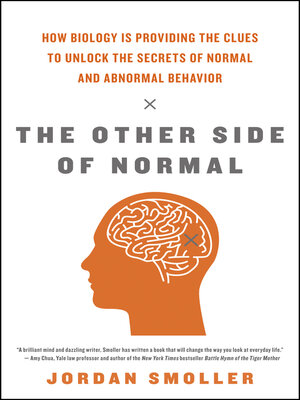The Other Side of Normal
ebook ∣ How Biology Is Providing the Clues to Unlock the Secrets of Normal and Abnormal Behavior
By Jordan Smoller

Sign up to save your library
With an OverDrive account, you can save your favorite libraries for at-a-glance information about availability. Find out more about OverDrive accounts.
Find this title in Libby, the library reading app by OverDrive.



Search for a digital library with this title
Title found at these libraries:
| Library Name | Distance |
|---|---|
| Loading... |
A Harvard psychiatrist uses biology, genetics, psychology, and advances in molecular neuroscience and neuroimaging to examine what it means to be normal.
"Move over Oliver Sacks—I couldn't put this fascinating book down! Path-breaking and witty, as entertaining as it is informative, The Other Side of Normal is filled with insights into why we behave as we do and how biology determines so much of our emotional makeup." —Amy Chua, Yale Law Professor and New York Times–bestselling author of Battle Hymn of the Tiger Mother
Psychiatry has ignored the normal. The focus on defining abnormal behavior has obscured what turns out to be a more fundamental question—how does the biology of the brain give rise to the mind, which in turn gives rise to everything we care about: thoughts, feelings, desires, and relationships?
In The Other Side of Normal, Harvard psychiatrist Jordan Smoller shows us that understanding what the mind was designed to do in the first place demystifies mental illness and builds a new foundation for defining psychiatric disorders—from autism to depression. Smoller argues there are no bright lines between normal and abnormal. Psychiatric disorders are variations of the same brain systems that evolved to help us solve the challenges of everyday life. Smoller explains where our personalities come from and how the temperaments we had as infants actually stay with us into adulthood. Why do we choose to date, love, and marry the people we do? Why do some of us form healthy relationships while others form unstable ones?
Based on the author's groundbreaking research and personal experiences treating psychological disorders, The Other Side of Normal changes the way we think about the human condition.
"Exciting . . . provocative . . . Clearly and articulately, he ties evolutionary psychology, biological psychiatry, animal behavior, and related fields into a package of rare coherence." — Publishers Weekly (starred review)
"Highly interesting and accessible study of brain science and behavior. . . . This thoroughly documented work provides enough information to satisfy the science-savvy without leaving the rest of us behind. . . . Readers will be fascinated." —Library Journal
"An informative overview of research in neuroscience that provides a scientific foundation for understanding mental disorders." —Kirkus Reviews







